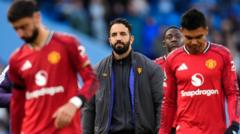Is Man Utd's Real Issue Their Personnel, Not the System?

Published: 2025-09-14 23:05:17 | Category: sport
Manchester United's ongoing struggles stem from persistent tactical errors and player misalignment, despite some improvements under manager Ruben Amorim's new formation. The team has shown glimpses of cohesion, particularly in their defensive structure, yet recurrent mistakes continue to undermine their performance, as evidenced by recent match outcomes. With a focus on positional issues and individual errors, United's challenges are not insurmountable, but they require immediate attention and strategic adjustments.
Last updated: 23 October 2023 (BST)
Key Takeaways
- Manchester United's tactical issues persist despite a shift to a 3-4-2-1 formation.
- Player misalignment, particularly Bruno Fernandes in a deeper role, contributes to defensive vulnerabilities.
- Errors are often due to individual mistakes rather than systemic failure.
- Improvements in team compactness have been overshadowed by recurring goal concessions.
- Manager Ruben Amorim's selection choices are critical to the team's success moving forward.
Understanding the Tactical Framework: Ruben Amorim's 3-4-2-1 Formation
Ruben Amorim's appointment as Manchester United's manager brought a new tactical approach, particularly the 3-4-2-1 formation. This structure aims to enhance team compactness, pushing players closer together both offensively and defensively. While it has led to noticeable improvements—such as better spacing and recovery during transitions—fundamental issues persist, particularly with player positioning and decision-making on the pitch.
Defensive Improvements and Ongoing Errors
Defensively, United have shown more organisation compared to previous seasons. The distances between lines have decreased, making it harder for opponents to penetrate. However, the recent derby loss against Manchester City highlighted that even a solid formation can falter due to individual errors. Simple lapses in concentration, particularly from key players, have led to goals that could have been avoided.
Spotlight on Bruno Fernandes: A Square Peg in a Round Hole
Bruno Fernandes’ role as a deeper midfielder has sparked debate. While his passing ability is exceptional, his defensive instincts appear lacking when he is tasked with tracking opponents. For instance, in the recent match against City, Fernandes lost track of Phil Foden, who capitalised on the mistake to score the opening goal. This incident underscores a critical issue: when players are not comfortable in their roles, it can lead to costly errors.
Positioning and Its Consequences
The placement of Fernandes in a more defensive role is indicative of a broader issue within the squad—players are often deployed in positions that do not leverage their strengths. Luke Shaw, for example, has been utilised as a centre-back despite being more effective as a left-back. This misalignment not only affects individual performance but also compromises the overall team structure.
Individual Mistakes: A Recurring Theme
Throughout the season, individual errors have been a recurring theme for Manchester United. The second goal conceded against City, where multiple players failed to execute their roles correctly, exemplifies this. Ugarte's decision to follow the ball instead of marking Foden allowed for a quick passage of play that led to the goal. Such oversights can often be traced back to a lack of confidence or clarity in players' assigned roles.
Addressing Systemic Issues Through Player Selection
While Amorim has established a tactical foundation, the effectiveness of that system hinges on the correct selection of players for each role. Moving forward, it is essential for the manager to evaluate whether certain players, like Fernandes and Shaw, are best suited to their current positions. Addressing these selection issues could significantly reduce the number of avoidable goals conceded.
The Bigger Picture: Optimism Amidst Challenges
Despite the rocky start to the season, it is important to acknowledge that United's performances have not been entirely negative. They managed a solid victory against Burnley and were competitive against Arsenal. However, the defeat to City revealed that, without addressing their tactical and positional shortcomings, they risk falling further behind in the Premier League standings.
Looking Ahead: What Needs to Change?
In order for Manchester United to turn their season around, several changes are necessary:
- Reassess Player Roles: The coaching staff must evaluate whether players are being utilised in their optimal positions, particularly Fernandes and Shaw.
- Enhance Defensive Awareness: Players need to improve their ability to track opponents and anticipate dangerous situations.
- Emphasise Team Cohesion: Continued work on team dynamics is essential to maintain the improvements seen in positioning and spacing.
- Maximise Tactical Flexibility: Amorim should consider adapting the formation or making adjustments based on opponents and match situations.
Conclusion: A Call for Tactical Adaptation
Manchester United's struggles are symptomatic of deeper tactical and positional issues that require urgent attention. While the season is still in its early stages, the recurring nature of these problems suggests that without strategic adaptations, the team may continue to face setbacks. The onus is on both the players and the coaching staff to identify and rectify these challenges, ensuring that United can build momentum and competitiveness throughout the season.
FAQs
What is Ruben Amorim's tactical approach at Manchester United?
Ruben Amorim employs a 3-4-2-1 formation at Manchester United, focusing on compactness and improved spacing between players on the pitch.
Why is Bruno Fernandes struggling in a deeper midfield role?
Bruno Fernandes has demonstrated exceptional passing ability but struggles with defensive responsibilities and tracking opposing players when positioned deeper in midfield.
What are the main issues impacting Manchester United's performance?
Key issues include player misalignment, individual defensive errors, and tactical inflexibility, all contributing to their struggles in matches.
How can Manchester United improve their defensive performance?
Improving defensive performance requires better player positioning, increased awareness of opponents, and a reassessment of tactical roles from the coaching staff.
Is there hope for Manchester United this season?
While the start has been rocky, there is potential for improvement if the team addresses its tactical challenges and makes necessary adjustments in player roles.



